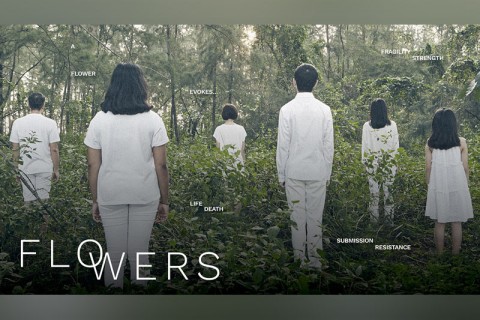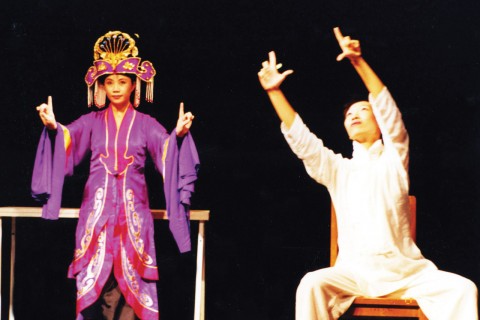Drama Box’s resident artist Han Xuemei brings her latest work, FLOWERS, which is an experiential installation on the cost of patriarchal violence. Through FLOWERS, Han wants to turn our attention on the everyday experiences of men and women, but not necessarily pitting gender against gender. Housed in Chip Bee Gardens, Han hopes that the installation will provide a reflective space to consider how living within a patriarchal system has cost us. How has its invisible hand meddled with our daily lives and our relationship with ourselves and the people around us?
What does “everyday experience” have to do with patriarchy? How does a “patriarchal system” translate to power inequality between genders and violence that goes beyond tangible abuse? How does the creative team look at the idea of “relationships”?
We speak to Han and her collaborators, Jean Tay, Lim Woan Wen and Darren Ng to try to unpack some of the dense concepts involved.

Han Xuemei
Patriarchal system
Han: To me, this refers to a way of thinking that places man at the centre of power in society. This way of thinking then manifests itself into the various aspects of life: self-identity, inter-personal relationships, family, education, governance and so on. Within this system, men are presumed to be superior to women, and masculine qualities such as control, domination, ownership are valued over feminine qualities such as emotional expressiveness and compassion. Men and women are also expected to display the prescribed qualities.
Tay: To me, patriarchy is a very big word, it’s very loaded and it comes with its own set of stereotypes. I think we often think of the violence wrought by patriarchy in terms of traumatic experiences of abuse, especially physical and sexual abuse. But for this project, we wanted to highlight the different forms this violence can take, and how subtle and insidious it can be, especially when the lines are not so clearly drawn. And we wanted to explore the impact of this hidden, everyday violence in a family setting, and to show how both men and women can perpetuate this violence even on those we are supposed to love and protect.

Everyday experiences of men and women
Han: I think this was influenced by Rukmini Sen's article about the "everyday culture of protest" - it led me to start wondering what is life as a man or woman like for us on a daily basis; what are the everyday encounters that we face that require us to protest against. There are some situations that tend to attract greater attention, and these situations are also usually picked up by the press. But there are also plenty of stories and situations that happen to a lot of us in our daily lives that are not discussed and questioned. For example, the dynamics within a family that many of us grapple with; the everyday fears that grow within us; the everyday choices that we make - these are what I mean by the "everyday experiences".
Reflective space
Ng: A reflective space to me is where one can experience something personal and look inward within oneself to find relevance and connection; having a better understanding of where to place one's feelings or thoughts, about certain things or subjects, after the experience. It is a meta-space for a person to insert their own stories and personal experiences, building upon the actual (architectural) space and its presented context. It asks you to choose your own way to engage, to involve, to invest and to read the space. It sometimes asks difficult and uncomfortable questions where answers may not be apparent, relevant and/or even present. One will have to find resolution within oneself.
In FLOWERS, it is not necessarily (just) a reflective space per se, although it can be if one chooses to engage it that way. We are building a space that does not spoon-feed meanings or narratives that are etched in stone, so visitors are actually just being present in the moment (or in a certain space-time-continuum) and perhaps, to act as a bridge to complete the experience and narratives for themselves.
Han: This is a physical, emotional as well as mental space for us to think about our own experiences as men and women, and to reflect on how patriarchy has manifested itself in our lives.

Lim Woan Wen | Darren Ng
Relationship
Han: The way things are connected. How is patriarchy connected to us? What is the connection between how we live our lives and the patriarchal values that are conditioned in us?
Lim: I chanced upon this passage from an article by Maria Popova recently:
Adrienne Rich, in contemplating how love refines our truths, wrote: “An honourable human relationship — that is, one in which two people have the right to use the word ‘love’ — is a process, delicate, violent, often terrifying to both persons involved, a process of refining the truths they can tell each other.” But among the dualities that lend love both its electricity and its exasperation — the interplay of thrill and terror, desire and disappointment, longing and anticipatory loss — is also the fact that our pathway to this mutually refining truth must pass through a necessary fiction: We fall in love not just with a person wholly external to us but with a fantasy of how that person can fill what is missing from our interior lives.
The article discusses specifically about romantic love, but I think the paragraph can be loosely applied to most, if not all, significant relationships as well - from family to close friends, and even the self.
While intimate relationships may not necessarily or always be violent or dramatic, they are essentially a tug-of-war between two parties/within ourselves and perhaps, also between actualities and our illusory expectations of life/people.
Ideally, the ultimate goal is not to win but to achieve an intricate balance. Reality is, however, never quite an ideal world...
------
Read part two of the interview here.
------
FLOWERS
by Drama Box
Date: 1 - 5 May 2019
Venue: Chip Bee Gardens
Visit event page

 One Table Two Chairs - Interview with Danny Yung (Part 2)
One Table Two Chairs - Interview with Danny Yung (Part 2)
 The Chronicles of Qian Chou in Shrimps in Space – An Interview
The Chronicles of Qian Chou in Shrimps in Space – An Interview
 The Orange Production - Drip - Interview with Nabilah Said
The Orange Production - Drip - Interview with Nabilah Said